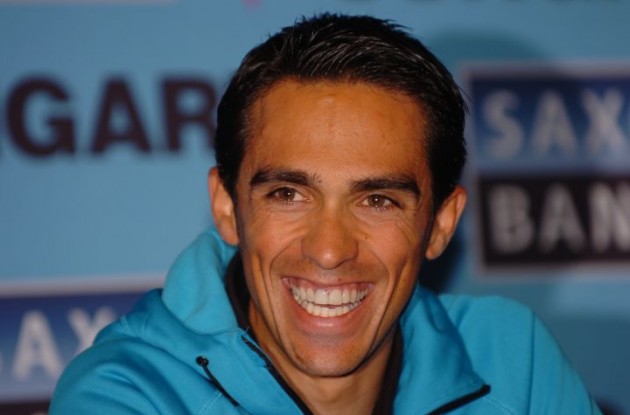Mixed Messages
A few doping cases are finally making their way through the system. Why is it taking so long and what type of message does it send to the cycling fan?
Cycling can be so confusing at times. I'm not talking about the inordinate amount of prize categories in the Giro d'Italia (Fast Team, Super Team, Escape Prize, Fair Play Prize). I'm talking about the people who are in charge of certain aspects of the sport. Doping and the results of doping are still front page news in cycling. Alberto Contador's case is finally going in front of the Court of Arbitration of Sport (CAS) and it was reported his defense team is willing to strap Contador to a lie detector as evidence that he didn't knowingly ingest clenbuterol. If you read my past column - he believes he didn't. However, knowing and believing are two different things.
An outsider to the sport of cycling might be confused as to why Contador's 2010 Tour de France case has taken so long to make its way in front of sport's supreme court. For one, Contador's own cycling federation exonerated him. The UCI appealed the ruling and that set the ball rolling for a showdown in Switzerland at CAS. Both sides will argue that the amount of evidence to be examined, in this case over 3,000 pages of documents, slowed the proceedings like a water bottle into the spokes. Regardless, this is the week and Contador has four days to convince three arbitrators that his positive for clenbuterol was due to a steak.
Of course that all pales in comparison to the Jan Ullrich case. The German won the 1997 Tour de France. However, his name - or at least code name - was discovered on some stored bags of blood in 2006, which became infamously known as Operation Puerto. Long story short - Ullrich retired from the sport in 2007 and until about a year ago hadn't even ridden a bike. However, of late he has been popping up at Gran Fondos and this past weekend rode in a 100 mile event in Miami, Florida. While there he told Velonews that he wants a ruling from CAS so he can move on with his life. Ullrich stated that he has no plans on ever being a competitive cyclist or become involved in cycling management, so ultimately whatever CAS decides has no bearing on his life. Ullrich will get that wish at the end of the month as that is when the Lausanne-based court will rule - doper or not. I guess better late than never.
However this next news item even confused me. Italian anti-doping prosecutor Ettore Torri in an interview with the Associated Press on October 6th, 2010 said that doping in cycling was widespread and will never be eradicated. Ouch! Now that's harsh considering all that the sport of cycling has done to combat doping. In addition to in-competition testing, there's out of competition testing, and of course the biological passport. And let's not forget cycling has banned HGH and steroids - something other sport's athletes are unwilling to allow testing for. I'm looking at you NFL.
In the interview Torri suggests that some doping should be legalized as long as it isn't a health hazard. The Italian prosecutor goes on to say that doping products are continually evolving and there's no way for anti-doping authorities to keep up. This is a very slippery slope. If we return to the days of when riders who were over a 50% hematocrit level and faced a two week "health check" suspension I fully expect climbing records of every Grand Tour mountain stage to be smashed. And also riders dropping dead from a myriad of health issues.
Fast forward a year and the same Italian prosecutor has had a change of heart.
Talking at an anti-doping conference in Italy Torri told the AP, "When I began with CONI (in 2006) the situation was dramatic. Today I can say that there has been a monumental change." Wow, that must have been a hell of a year to go from him saying that anti-doping efforts are only catching a small amount to now saying, "interest in doping has lessened."
He claims the big change is due to riders' associations not turning the other way and harsher sentences are being handed out for offenses. Torri goes on to pat himself on the back by saying that drug use in the professional peloton has lessened due to his efforts. However, my favorite quote from the Italian prosecutor is that doping in the amateur ranks has become a problem and that, "they (amateur athletes) do anything to win a salami in ridiculous races." To put your health at risk for a salami? It must be really good stuff.
Italy isn't the only place having issues with amateur racing. Here in the States another master category racer was sanctioned - this time for refusing to take an out-of-competition test. This racer is 63 years-old so you have to wonder why USADA bothered to test him. If you believe the cycling forums he was bragging about how he was doping, so someone picked up the phone and tipped off the authorities. If I was a family member I'd be concerned that this was a sign of an onset of Alzheimer's as this sounds crazy! This is something I learned way back in elementary school - if you're going to cheat, keep it to yourself. Or at the minimum only tell your fellow cheaters.
While Torri believes things are looking up in the battle against doping the World Anti-Doping Agency's David Howman might disagree. In an interview with the Associated Foreign Press Howman said, "Do you think that we have the science to track those who dope in a sophisticated manner? Personally, I don't think we do." Ouch!
The general director says that EPO continues to be the drug of choice for endurance athletes by micro-dosing it. Injecting small amounts is enough to get a bit of an athletic performance boost, but low enough to fly under the radar.
Howman states that according to Interpol there's more money being made in the trafficking of performance enhancing drugs than heroin! According to CNN the heroin trade is a 65 billion dollar market. I'll be honest - I had no idea that kind of money was being made in PED trafficking!
One side is saying that we have dopers on the run and the other stating that we're fighting a losing battle. Caught in between are the casual fans who don't know if cycling is as legit as professional wrestling. For us, the tifosi, we enjoy cycling for a variety of reasons - whether it's because of the beauty, the competitiveness, or just because it gets us outside. However, as anyone involved in the cycling industry will tell you, we need to get the weekend warriors to fall in love with the sport. And that will be a hard thing to accomplish when the people in charge keep sending out mixed messages regarding the health of cycling - filled with dopers or a few bad apples?
I'm a glass half-full type of guy and I feel that it's just a few cheaters and the majority are racing clean. That said - I'm not naïve enough to believe the stories from riders who have been caught for doping. I've been suckered into that one too many times. So my words to CAS, WADA, UCI, and any other agency investigating doping: let's get to a resolution in a timely manner. Five-years is far too long to be in limbo. Hell, even over a year is a SNAFU. It's time to start pulling the trigger on these cases and move forward.








